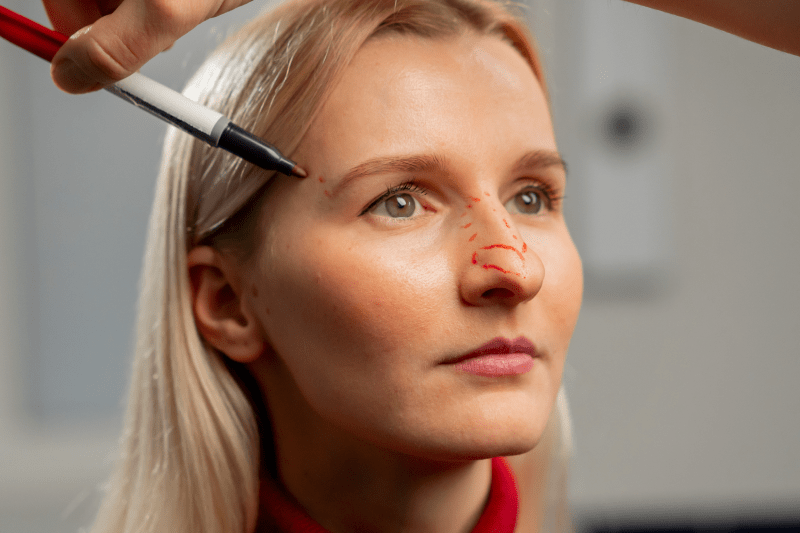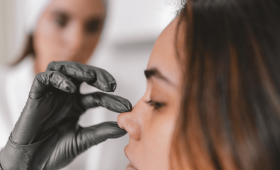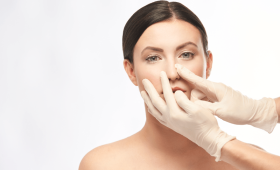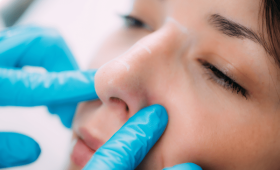What Is Rhinoplasty And Who Is It Suitable For?
Rhinoplasty is a surgical procedure performed to improve the shape, size, or proportions of the nose. It can also be applied to correct breathing problems, which is then called septorhinoplasty. This surgery is suitable for anyone over the age of 18 (who has completed nasal development) and is in good general health, wishing to correct a hump on the nasal bridge, lift or narrow the nasal tip, reduce the size of the nostrils, or fix asymmetry. Most importantly, the patient is expected to have realistic expectations about the surgical outcome and be psychologically ready for the process. Expert surgeons and consultants at Cure Holiday in Turkey will offer you a comprehensive pre-assessment to determine your suitability.
What Is The General Process Of A Nose Job Surgery Like?
The nose job process begins with a detailed consultation with your surgeon, during which your expectations are clarified, and possible outcomes are determined using 3D simulations. The surgery usually takes 2 to 4 hours under general anesthesia. Depending on the chosen technique, the surgeon makes incisions inside or outside the nose (in open rhinoplasty) to reshape the cartilage and bone structure. Patients typically stay in the hospital for one night after the surgery. To ensure this process runs smoothly and you have a personalized experience, choosing internationally standardized treatment at hospitals selected through Cure Holiday in Turkey is the most appropriate step.
What Is The Key Difference Between Open And Closed Rhinoplasty?
The main difference between open and closed rhinoplasty is the way the surgeon accesses the nasal structure. In closed rhinoplasty, all incisions are made inside the nostrils, leaving no visible external scarring. In open rhinoplasty, a small, inverted “V” shaped incision is made on the columella between the nostrils; this incision allows the surgeon to see the cartilage and bone structure more clearly, enabling more precise adjustments. The open technique is preferred, especially in revision or complex deformities. Surgeons in Turkey adopt a personalized approach that maximizes both aesthetic and functional results when deciding which technique is most suitable for you.
How Long Does The Recovery Period After Rhinoplasty Take?
The recovery period after rhinoplasty is gradual. During the first week, the nasal cast and splints are in place, and swelling and bruising peak. After the cast is removed (usually on the 7th day), the major swelling rapidly subsides, and the nose’s new shape begins to become apparent. A return to daily life is possible within 10-14 days. Although 80% of significant swelling resolves within the first month, the nose may take 6 months to 1 year to fully settle into its final shape, with the finer swelling completely disappearing. With Cure Holiday in Turkey, you can manage this process comfortably with regular follow-up and support at every stage of your recovery.
When Do Swelling And Bruising Subside After Surgery?
Swelling and bruising that occur after surgery are a natural consequence of the surgical intervention and the technique used. Bruising usually fades significantly within 10 to 14 days. Swelling is divided into two main categories: initial noticeable swelling (first 2 weeks) and fine swelling. While the initial swelling subsides quickly, the fine swelling, especially on the nasal tip, takes longer to fully resolve, sometimes extending to 1 year. Management of this swelling involves cold compresses, keeping the head elevated, and special massage techniques recommended by the surgeon. Clinics in Turkey contribute to your recovery by providing supportive treatments and detailed care instructions to speed up this process.
How Long Does It Take For The Nose Job Result To Fully Settle?
The final result of the nose job and the full settling of its shape generally take 1 year, although this varies depending on the patient’s skin type and the complexity of the surgical technique applied. The main contours of the nose become apparent, and major changes are observed within the first 3 months. However, in patients with thick skin, in particular, edema (swelling) on the nasal tip can be stubborn and may persist for 12 to 18 months. Surgeons in Turkey monitor this long-term process using digital follow-up systems. Cure Holiday supports you through online consultations and assistance at every stage of your recovery, helping you navigate this demanding period with confidence.
What Preparations Should Be Made Before The Surgery?
Certain critical preparations must be made before rhinoplasty surgery for a successful outcome. These include completely quitting smoking and alcohol consumption at least two weeks before the surgery (as they negatively affect healing), and discontinuing blood thinners and certain vitamin supplements (like Vitamin E, fish oil) under medical supervision. Additionally, mandatory pre-operative tests, such as blood work and, if necessary, an ECG, must be completed. Cure Holiday in Turkey organizes all these preparatory processes and includes medical tests in the package, eliminating the complex bureaucratic burden you might encounter in countries like Croatia or Serbia.
What Anesthesia Methods Are Used During Rhinoplasty?
Rhinoplasty surgeries are almost always performed under general anesthesia due to the duration and complexity of the surgical procedure. General anesthesia ensures the patient is completely asleep and feels no pain throughout the operation. While some very simple tip corrections can be done under local anesthesia with sedation support, general anesthesia is the safest and most commonly used method. In JCI accredited hospitals in Turkey, anesthesia is administered by experienced anesthetists using the most modern equipment. Cure Holiday ensures you choose clinics where this vital safety element during surgery is guaranteed within the package.
What Problems Can Be Solved With Rhinoplasty Surgery?
Rhinoplasty surgery can solve many problems, both aesthetic and functional. Aesthetically, issues such as a dorsal hump on the bridge of the nose, a wide or droopy nasal tip, asymmetric nasal structure, and wide nostrils are corrected. Functionally, conditions causing breathing problems, such as a deviated nasal septum (septum deviation) and enlarged nasal turbinates (concha hypertrophy), are addressed. Expert surgeons in Turkey have deep experience in solving these two issues in a single operation, and Cure Holiday offers you the most comprehensive solution.
Are Breathing Problems Experienced After A Nose Job?
It is normal to experience temporary breathing difficulties immediately after the surgery and for the first few weeks due to swelling and splints/tampons. However, this condition is not permanent. If the rhinoplasty was also performed to correct functional issues like a deviated septum (septorhinoplasty), a significant improvement in breathing quality is expected in the long term. Surgeons in Turkey frequently use “preservation rhinoplasty” techniques that prioritize maintaining and even improving nasal function. This ensures that in addition to aesthetic enhancement, functional improvement is also secured.
In Which Cases Is Revision Rhinoplasty Necessary?
Revision rhinoplasty is necessary when the patient is dissatisfied with the previous nose job in terms of both aesthetic results and functional aspects. The most common reasons include a dropped nasal tip, irregularities on the nasal bridge, persistent asymmetry in the cartilage or bone structure, or breathing difficulties developed after the initial surgery. Revision surgeries are technically more demanding and complex than primary operations. Turkey hosts highly experienced surgeons with high success rates in these challenging revision operations. Cure Holiday guides patients needing revision to find trusted specialists.
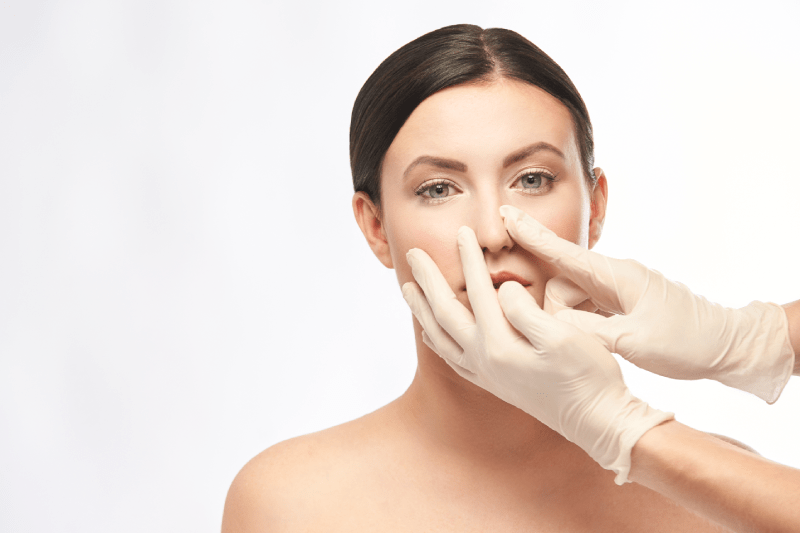
When Can Daily Life Be Resumed After Rhinoplasty?
The time to resume daily life after rhinoplasty surgery varies from person to person, but generally occurs within 7 to 14 days. Patients can usually return to their social lives or office jobs after their casts are removed (Day 7), as the major swelling and bruising will have subsided significantly. However, it is mandatory to avoid strenuous physical activities, sports, and trauma to the nose for at least 6 weeks. The comfortable accommodation and transfer services offered by Cure Holiday in Turkey support your recovery process, accelerating your return to daily life.
Is There An Age Limit For Rhinoplasty?
Yes, there is a generally accepted age limit for rhinoplasty. This limit is related to the completion of the nasal bone and cartilage structure’s development. Typically, 16-17 years old for girls and 17-18 years old for boys is considered appropriate for this operation. The completion of nasal growth is important for the nose shape to remain stable after surgery and not be affected by growth potential. Expert surgeons in Turkey assess the status of growth plates before the operation to determine the most accurate timing. Cure Holiday supports young patients and their parents in planning this process safely.
Is Rhinoplasty Surgery A Painful Procedure?
Since rhinoplasty surgery is performed under general anesthesia, you will not feel any pain during the procedure. In the post-operative period, patients usually describe a slight discomfort, a feeling of pressure, or congestion (fullness) in the nasal area, rather than severe pain. This discomfort is easily controlled with prescribed painkillers. Clinics in Turkey apply the most effective pain management protocols to maximize patient comfort. By receiving treatment through Cure Holiday, you can receive all the necessary medical support and medications included in your package to get through this process with minimal discomfort.
When Are Nasal Splints Or Bandages Removed After Surgery?
The protective cast or thermal splint (bandage) on the nose after rhinoplasty surgery is usually removed by the surgeon one week after the operation (on the 7th day). Silicone splints (tampons) placed inside the nose to facilitate breathing are mostly removed at the same time or a few days later. After the bandages are removed, the nose appears in its new shape, but it will not be possible to see the full result immediately due to initial swelling. Your surgeon in Turkey performs this critical removal procedure gently and in a hygienic environment, allowing you to continue your recovery process.
How Is A Natural Look Achieved In Rhinoplasty?
A natural look in rhinoplasty is achieved when the surgeon creates a personalized design that considers not only the aesthetic issues of the nose but also the general contours of the face, other facial features, and ethnic structure. The goal is to create a nose that is harmonious with the face and complements the person’s own appearance, without looking obviously operated on. Experienced surgeons in Turkey prioritize preserving nasal tissue and function using minimally invasive techniques like “preservation rhinoplasty.” Cure Holiday connects you with specialists who focus on natural results and have proven artistic skill, guaranteeing the best outcome.
How To Choose The Right Surgeon For Successful Rhinoplasty?
Choosing the right surgeon is critical for successful and natural rhinoplasty results. When selecting a surgeon, one must pay attention not only to the price but also to their experience, specialization in rhinoplasty, previous patient results (before/after photos), and the international accreditations of the hospital they work with. A good surgeon clearly understands your requests and offers you realistic results. Cure Holiday in Turkey meticulously filters trustworthy surgeons and JCI-accredited clinics with international certifications and proven expertise, making this challenging selection process easy for you and prioritizing your safety.
What Is The General Cost Range For Rhinoplasty In Croatia?
The general cost range for rhinoplasty surgeries in Croatia varies significantly depending on the surgeon’s popularity, the surgical technique used (e.g., Piezo technology), and whether the surgery is performed open or closed. Prices are generally positioned below those offered by Western and Scandinavian countries, which may make Croatia attractive to European patients. However, when receiving a price quote, it is critically important to check in detail whether additional costs such as anesthesia, hospital stay, bandage and splint expenses, and basic post-operative controls are included in the package, to avoid unexpected surprises.
Do Low Price Offers Affect Surgical Quality?
Aesthetic surgery is a field that requires a high level of art and technical mastery. Excessively low price offers in rhinoplasty usually indicate a low level of surgeon experience or outdated operating room equipment. Especially since nose aesthetics require millimeter calculations, one must ensure that a low price does not mean compromising the surgeon’s training quality or the hospital’s hygiene standards. It should be remembered that the revision cost of an unsuccessful rhinoplasty can be much higher than the initial surgery, and this process can negatively affect both the patient’s health and psychology. It is wiser to choose JCI accredited centers in Turkey for reliable and affordable treatment.
What Services Are Included In The Rhinoplasty Cost?
A comprehensive rhinoplasty package generally includes the surgical procedure fee, the anesthesiologist’s fee, and the cost of a standard one-night stay at the hospital where the surgery is performed. In addition, necessary basic pre-operative blood tests and initial consultations with the surgeon are usually included in the price. Health tourism packages prepared for international patients often include airport transfers and hotel accommodation for the recovery period, reducing logistical stress. When getting your price quote, it is important to ask whether consumables like nasal splints or special bandaging materials are included.
Which Cities In Croatia Are The Most Popular For Rhinoplasty?
The most popular city for aesthetic surgery and medical tourism in Croatia is generally the capital, Zagreb. Zagreb is preferred because it has an international airport and hosts the majority of the most modern private hospitals and aesthetic clinics. Although coastal cities like Split and Dubrovnik also have some smaller clinics due to their tourist appeal, the most comprehensive and technologically advanced surgical centers are generally concentrated in Zagreb. In Turkey, major metropolises like Istanbul, Ankara, and Antalya offer high-quality and organized rhinoplasty services throughout the year.
What Is The International Experience Of Surgeons In Croatia?
The international experience of aesthetic surgeons in Croatia can vary from clinic to clinic. Some surgeons may be members of international organizations like the European Board of Plastic, Reconstructive and Aesthetic Surgery (EBOPRAS) and may have trained abroad. However, the case volume and variety of different nasal types are generally lower compared to aesthetic surgeons in Turkey. Since rhinoplasty requires surgical decisiveness and aesthetic perspective, working with surgeons who have a high volume of cases increases your chances of success. Therefore, choosing Turkish surgeons with high international recognition may be more advantageous in terms of outcome assurance.
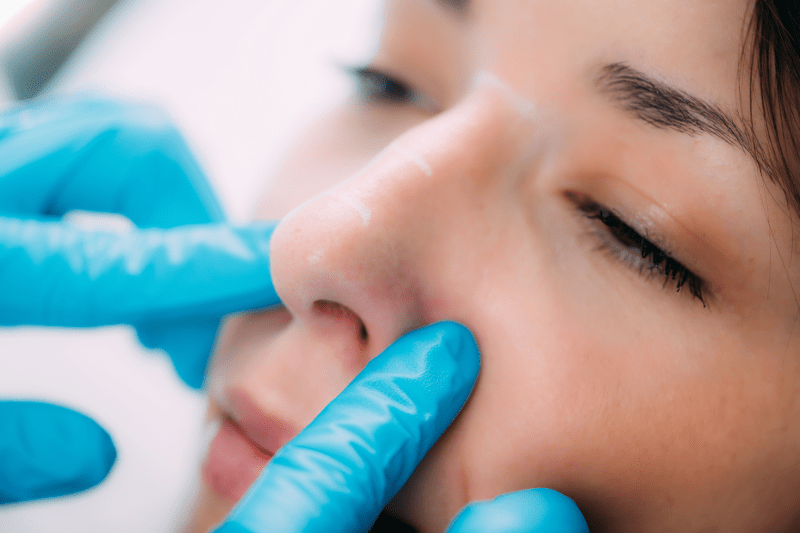
Is The Pre-Operative Consultation In Croatia Subject To A Fee?
Most private aesthetic clinics in Croatia may charge a fee for the initial comprehensive facial analysis and surgeon consultation conducted before the surgery. It should be clarified beforehand whether this fee will be deducted from the total price if the patient decides to proceed with the surgery. Online or remote pre-assessments can generally be offered for free or at a lower cost. However, when you contact Cure Holiday in Turkey, initial online consultations with the best surgeons are often provided free of charge, allowing patients to get information and a second opinion without financial risk.
Who Bears The Cost Of A Possible Revision Need?
Revision surgery may be required due to aesthetic or functional problems that may arise after rhinoplasty (generally after the first year). Revision surgery is a much more difficult and costly process than the initial surgery. Clinics in Croatia may not offer a guarantee for revision expenses, even if they cover the cost of the first surgery. Therefore, it is essential for patients to have comprehensive insurance to cover potential revision costs or include this additional expense in their budget. In Turkey, due to high success rates, the need for revision is lower, and some centers may offer support under specific conditions in case of revision.
What Is The Duration And Cost Of Hospital Stay?
Although rhinoplasty surgery is generally performed under general anesthesia, a one-night hospital stay is usually sufficient for most patients. This one-night stay is typically included in the basic cost of rhinoplasty packages in Croatia. During this time in the hospital, the patient’s pain management is provided, and the correct placement of the nasal tampons or cast is checked. The need for an extra night’s stay (unless medically necessary) is rare, but if required, the additional accommodation fee is added to the package, and these costs may vary depending on the hospital’s comfort level.
Are Post-Operative Check-Ups And Follow-Up Included In The Fee?
The success of rhinoplasty surgery depends on regular post-operative control and follow-up. Most packages in Croatia include the removal of the splint or cast and basic check-ups in the first few weeks (usually 1-2 times). However, long-term follow-up (6 months, 1 year, and beyond), especially for international patients, may be offered as remote consultations for an additional fee. Choosing to be treated through Cure Holiday in Turkey guarantees that your recovery process is meticulously managed, providing uninterrupted remote follow-up and photo evaluation even after you return to your country.
How Is The Language Barrier Overcome In Croatia?
Although English is widely spoken in Croatia, especially in tourist and medical centers, professional interpretation services are essential to prevent misunderstandings during the surgical procedure and medical instructions. Hospitals may not always be able to provide this service with their own staff. In this case, patients should arrange their own interpreter or use a health tourism agency. Cure Holiday in Turkey includes professional interpreter support who speaks the patient’s native language throughout all hospital and transfer processes, ensuring seamless and safe communication.
Can Accommodation And Transfer Services Be Included In The Package?
Depending on the scope of the rhinoplasty packages in Croatia, airport transfers and luxury hotel accommodation (usually 5-7 nights) covering the post-operative recovery period may be included in the package. These logistics services reduce the travel stress of international patients and increase recovery comfort. However, these services are excluded in low-priced offers that only include the surgery. Cure Holiday in Turkey generally offers 4 or 5-star hotel accommodation and VIP transfers covering all transportation as part of its standard packages, providing patients with complete comfort and assurance.
What Is The Cost Of Necessary Pre-Operative Tests?
Before rhinoplasty surgery, standard tests such as basic blood tests and an electrocardiogram (ECG) are performed to check suitability for general anesthesia. Most comprehensive packages in Croatia include the cost of these mandatory tests. However, if the patient has an additional health problem (e.g., chronic sinusitis or severe allergies), additional imaging (MRI or Tomography) or an ENT specialist consultation may be required to evaluate this condition. These additional examinations are generally excluded from the package and must be added to the patient’s budget.
Are The Surgical Techniques Used In Croatia Up-To-Date?
Advanced aesthetic clinics in Croatia generally apply up-to-date surgical techniques (e.g., ultrasonic Piezo rhinoplasty). Advanced methods like Piezo technology shape bones with vibration instead of breaking them, reducing bruising and swelling, and speeding up the recovery process. However, the number of surgeons and hospitals with this technology may not be as widespread as in Turkey. Turkey hosts many specialists who apply modern methods like Piezo and preservation rhinoplasty with high volume and are internationally recognized for their results. Inquiring about the technique your surgeon uses before the operation is important to understand the quality of the service you will receive.
Why Is Having Treatment In Turkey A More Reliable Option?
Turkey offers high expertise in rhinoplasty surgery, hospitals with international JCI accreditation, and deep experience gained through a high volume of patients. The extensive experience of Turkish surgeons with different ethnic nose types increases the chance of achieving personalized and natural results. Furthermore, the logistical, interpretation, and up to 1 year of remote follow-up support offered through Cure Holiday eliminates many problems you would have to resolve individually in Croatia. Turkey combines quality, safety, and cost-effectiveness with a more organized health tourism infrastructure.
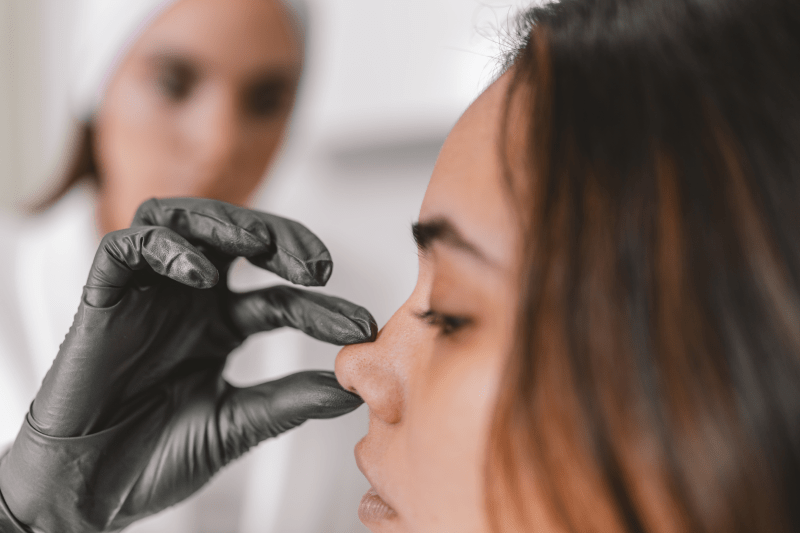
What Advantages Do Packages In Turkey Offer Compared To Croatia?
Rhinoplasty packages in Turkey are generally more comprehensive and closer to an “all-inclusive” concept compared to offers in Croatia. These advantages include: VIP transfers between the airport-hotel-hospital, accommodation in luxurious 4 or 5-star hotels, free professional interpreter support throughout the entire process, and a remote follow-up system for the post-operative period. These comprehensive services ensure the patient focuses solely on recovery and solve all logistical problems that might incur extra costs in Croatia. Treatment in Turkey is superior in terms of overall comfort and assurance.
What Is The Average Waiting Time For Rhinoplasty In Croatia?
The schedule of popular and qualified rhinoplasty surgeons in Croatia varies depending on the time of year, but the average waiting time can range from a few weeks to up to 2 months. This period may lengthen as demand for medical tourism increases. Making an early reservation after finalizing your program increases your chances of having the surgery on your desired date. Thanks to Turkey’s high capacity and large number of expert surgeons, waiting times can generally be kept shorter, and international patients’ demands can be met more quickly.
Why Does Cure Holiday Recommend Turkey Over Croatia?
Cure Holiday prioritizes centers that offer the highest quality results, patient safety, and long-term satisfaction in rhinoplasty. Although Croatia offers attractive prices, the case volume of surgeons in Turkey, the number of JCI accredited hospitals, and the 1 year of uninterrupted follow-up support provided offer greater assurance for a sensitive procedure like rhinoplasty. Treatment with Cure Holiday in Turkey offers a “turnkey” solution that covers not only the surgery cost but also all logistics, communication, and follow-up processes, ensuring patients achieve their desired appearance in the most stress-free and safest way. Therefore, Turkey stands out as a global leader in aesthetic surgery.
